|
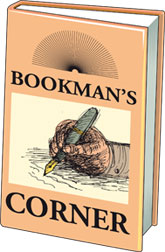
A comic perspective of human nature
Reviewed by Prof. Siromi Fernando
The Mirror of Paradise is a volume of thirteen short stories by Asgar
Hussein. His earlier publication - Termite Castle - was a volume of
poetry for which he was acclaimed by critics as "capable of unusual
range and variety of subject and possessing an authentic and original
voice". In The Mirror of Paradise, Hussein has turned to a new genre. He
focuses on human nature, with his subject matter possessing similar
width and variety, dealing both with urban phenomena like the
underworld, high-level swindlers, booze sessions, cricket by 'boys down
the lane', and abstract art; as well as more rural issues like village
politics and evil spirits. He uses a comic view to present a keen and
original analysis of human nature.
There are two significant characteristics of this new volume. First
is his natural and easy style of writing. Secondly, there is the
masculinity of his style of writing and perspective of human nature. The
opening of the story And All Because of a Fag demonstrates the natural
and easy style of writing:
It was a beautiful evening, and Gamini was taking a leisurely stroll
along Galle Face when someone shouted his nickname.
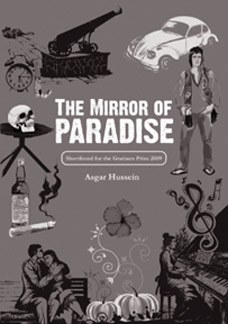 "Oi, Gemba!" "Oi, Gemba!"
Gamini was startled, and turned around to see his old friend Brian.
The man was
sitting pompously on the pedestal of one of those old Dutch cannons
facing the Indian Ocean.
Brian waved a hand, and Gamini walked over to join him. But as he
approached he saw something that made him shudder. There beside Brian
lay a heap of prawn vadais bought from some wayside food cart.
Words that spring easily into the minds of Sri Lankans are used in
the vocabulary items 'Galle Face', 'those old Dutch cannons', 'a heap of
prawn vadais', 'wayside food cart', giving a vividly authentic
description of the situation. The phrases 'shouted his nickname', 'Oi,
Gemba', 'the man' puncture the formality of Standard English and
introduce the story in a natural style of Sri Lankan English.
The masculinity of style and perspective is evident throughout all
the stories, in the number of male characters, the types of situations,
the descriptions, and the flavour of language and style. The passage
below illustrates this masculinity:
Ranil suddenly found himself numb with fear. The big fellow with the
moustache tossed his chair aside and pulled out a knife from his sarong,
flashing it menacingly...A bare-bodied man emerged from the kitchen with
a thick piece of firewood in his hand, and raucous shouts of "Kill the
pariah!" filled the place.
They had him surrounded within seconds, so escape was impossible. Two
of them dragged him by the collar towards a barrel-chested man with
bloodshot eyes. "So you are one of Nondi Chamal's dogs, eh?" the fellow
asked, pointing a long and dirty fingernail...
The man thrust his head forward so that his breath smothered Ranil's
face.
"We are Walgama Simon's people," he announced.
Ranil was now shivering like a wet chicken.
Walgama Simon's people. Walgama Simon. The gang leader who had sworn
to roast Nondi Chamal alive on hot embers after the man sprayed his
house with gunfire, shot his parrot and cut off his sister's hair!
The masculine handling of these stories is refreshingly different
when one places these against the bulk of Sri Lankan English creative
writing, which is written by women authors.
Asgar Hussein's world, or milieu, is essentially the current Sri
Lankan multi-ethnic, multi-linguistic setting. He appropriates a comic
view to analyze different facets of this milieu. For example, he finds
absurdities in the activities of marriage brokers and rich parents
looking for prospective suitors for their daughters. So he knits two
hungry Arts undergraduates into the story A Good Medical Boy to present
a series of hilarious situations. In A Man of Strong Opinions, he
highlights the inadequacy of controlling the mosquito menace and the
spread of dengue by satirically exploiting the hatred of two characters
- a middle-aged bachelor academic and a coarse relative of an important
politician. In Trouble down Araliya Lane, Hussein brings to the reader's
attention the ever-present nuisance of boys who have nowhere to play
cricket except on the lanes. The issue is discussed by depicting the
vigorous boys, the characters Ranjith and his wife and their marital
disputes, and the neighbours, building up an extremely humorous story.
In the early period of creative writing in Sri Lankan English,
writers were guilty of 'sentimental ruralism', 'contemplating the
country side or rural characters'. However, as Sri Lankan English
literature has developed, it 'has come to grips with its own particular
milieu, the world of the Westernized, English-speaking class'(Halpe
1990). In the present period with writers like Asgar Hussein, Sri Lankan
English creative writing has come to grips very naturally, without
conscious attempt or any undue force, with a changed milieu, the world
of the multi-ethnic, multi-lingual class for whom English is one of
their national languages but also their first or co-first language. This
is best demonstrated by Hussein in the stories that deal with suburban
and rural characters. In the story In the Dead of Night, the reader
encounters one main character, Simon, who does odd jobs for Bastian
Mudalali. The story opens as follows:
Oi, Simon, open the door!
Those words, followed by several thumps that shook the room, roused
Simon from the depths of a dreamless sleep. He sprang from his mat and
crouched in a corner, his eyes bulging.
Although narrated in English, the words spoken and the sound that
issues from the knocking reflect very naturally the rough Sinhala that
is used in the domination of the Mudalali, a very important personage in
the village, over Simon, a menial. The response from Simon 'sprang from
his mat and crouched in a corner' portrays in unselfconscious language
Simon's status as well as a person who sleeps on a mat as opposed to one
sleeping on a bed.
Simon's task was to carry a load of provisions to a caterer in the
dead of night.
Although obliged to obey the Mudalali's orders, Simon was also
gripped by fear. This is depicted very skilfully by the referential
framework. Asgar Hussein uses characteristically Sri Lankan imagery and
phenomena. Simon's fear is given below in the referential framework that
is appropriate to Sinhala villagers:
The road ahead was narrow and stretched endlessly, twisting like a
snake at certain places.....Simon gripped the bars of the pushcart
tighter and increased his pace. Something was gnawing at his mind.
Something dark and sinister. And then he realized it! That evening, an
hour or so before going to sleep, he had eaten some fried pork at a
friend's place.
He had heard many tales about how fried foods lured demons. Simon's
psychology is well shown through including a four-line mantra in the
story. Other Sri Lankan English writers have included such verses in
English stories but their code-switching to another language at great
length has resulted in a contrived effect. Hussein's use of
code-switching on the other hand is short and appropriate, building up
effectively his referential framework.
In summary, I am sure you will enjoy many a laugh when you read The
Mirror of Paradise. You will also experience good Sri Lankan English
writing which has turned ordinary situations of Sri Lankan society
artfully into good Sri Lankan English literature. And on a very
significant note, you will encounter a relatively new writer using a new
genre to analyse human nature with confidence and great skill.
(The reviewer Prof. Siromi Fernando was formerly the Professor of
English, University of Colombo. She is a renowned academic whose current
research focuses on Sri Lankan English).
Resurrecting memories of a bygone era
Reviewed by Padma Edirisinghe
If a yardstick for a successful scholarly work is a composite of wide
dimensions of content plus its sincerity, authenticity suffused with a
high thought -provoking element, then the book, "A 16th Century clash of
civilizations" has certainly "made it". The content that the author
tackles in a broad and fantastic sweep is also aligned to a very
powerful period not only in Lankan history but in global history.
Powerful indeed, yet tragic too. To put it tersely it is eulogized as
the period when the world began to open up, globalization setting in
wizard -style. The Renaissance Industrial revolution Voyages of
discovery -these were the magic wands that introduced a new world order
ensuring in a long run European supremacy over a good pat of the
globe... .
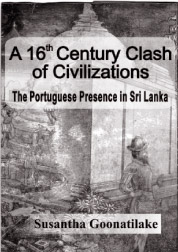 |
|
A 16 th Century Clash
of
civilizations
Author:
Dr. Susantha Goonetilake
Vijitha Yapa Publishers |
But no one would gainsay the fact that it was also a poignant period
when mighty empires of the Orient collapsed like paper castles before
the bayonet and the bullet. Edifices built over centuries were destroyed
and inroads were made to the indigenous way of life, alien forces just
bulldozing in with ferocity.
The spread of Iberian (Portuguese and Spanish) power can be reckoned
as the most catastrophic period with the Vatican itself buttressing
their ruthless activities. It is this period of Portuguese dominance in
our island that has fallen subject to Dr. Susantha's assaults in this
book.
But it would be under-rating the book, if one sees it only though
this perspective. It is something much more mighty. It reveals a mind
that has been churning over the issue for years. Information given in
the different chapters may not come as completely new material to those
interested in subjects as this but it is the juxtaposition of the
material that makes the book special.
For example, Dr. Goonetilake as a prelude to the "blood bath"
activities of the Ferenghis traces the multitude of cordial relations
the island had been having for centuries with foreign countries.
Except for certain South Indian invasions as the Magha onslaught,
these relations had been very friendly. Chapter 2 under the headings
"The Sinhalese presence in the then world", "Buddhist travel" "the West"
"China" "South East Asia" and "Trade connections" opens out the curtain
on a forgotten era in the country's history when it was almost the hub
of trade routes of the East. Foreigners were no strangers in the island
sited right in the centre of trade and passenger routes.
But unfortunately not only for us as well as for these later Western
foreigners that earned them a black blotch that can never be erased, the
latter came across the shores with not only plunder and their own
material enrichment on the agenda but with a wicked determination to
transform the mental ethos of Asian countries through the message of
Christ.
Religions are nothing new to Asia, which actually is the springboard
for today's major religions but most of these religions have always been
peaceful and tolerant of other creeds. But now a new element entered
tinged with the misguided notion that the West is mentally superior to
the East, actually the bedrock of wisdom.. However, at the time of
voyages of discovery, famous or infamous Asia had become divided and
decadent. The Bible came along with the gun and incredibly cruel feats
were orchestrated in the name of religion. Here is not a biased native
writer, but a Portuguese historian himself, Faria Souza, quoted on the
subject. "Babies (Sinhala _babies) were spitted (impales) on the
soldier's pikes and held up so that parents hear the young cocks crow",
The author together with Queroz, a very noted writer of the same race
wax on further ferocious acts, perhaps inflicted on those who refused
conversion. These included throwing folk into the Kelani to be devoured
by crocodiles, "and those creatures were so used to this food that at a
whistle they would lift their heads above water". Malvana of rambutan
fame, then headquarters of Portuguese rule still resonates with these
horror tales. Needless to say it was one of the most horrific periods of
our history.
Should such grisly historical facts be pushed under the carpet and
silence maintained? Or should the perpetrators be summoned for
punishment? Unfortunately, those actors as the dreaded Azavedo now lie
restlessly in the silence of cemeteries. Insensitivity to the issues
involved had made some even plan a 500 year celebration of the
Portuguese conquest of maritime Lanka. Never did it materialize, as
opposing forces threw their weight. The author devotes two chapters to
the issue of the Vatican's obligation to apologize on behalf of "war
crimes" or "crimes connected to the spread of Portuguese power and
Christianity in Lanka". The Pope has apologized to several countries
thus setting a precedent but Sri Lanka has been hitherto overlooked.
Dr. Goonetilake describes the book as part of a large scale research
project of the Royal Asiatic Society on the Portuguese Encounter
(putting it mildly, that is) but as a member of that project, the
reviewer maintains that this book is something more mighty. Some of the
reasons have been explained earlier. One of his books "The crippled
mind" has earned this blurb from the Indian Historical Review
"Ambitious, the canvas large" which remark fits into this work too. It
is "A social epistemology not explored by earlier writers"..and that
tells a lot.
The source material quoted comes in, in abundance. entrenching its
authenticity. The illustrations are pofuse covering nooks and corners
spanning desecrated holy places ranging from Kurusewatte in deep South
Devinuwara to the Buddha footprint at Wahacotte church in North Central.
And another accolade not to the writer so much but to the printers and
publishers, though try as I did in the style of my ancient school marm
role, I could not find a single printer's devil.
Yet a few lapses in the narrative were observed. One is that Sri
Rahula Thera had distilled his famous oil concoction to prolong his
life, whereas it was to preserve his corpse to an optimum age that he
had done indulged in this labour. He was an experimentalist cum
scientist cum brilliant poet. It was news of this feat that had led to
the famous exchange of corpses at Ambana cave. If this story is
authentic it can top the list of bizarre events typical of the colonial
era of world history. History is funny and unpredictable as its main
player, the human. To the Great Thathagatha is attributed this saying,
"Sabbe prathagnana unmaththaka" (All human beings not attained Marga
pala carry some madness within them)". I remember meeting a Miss,
Azavedo at a certain gathering. She was a very pleasant Portuguese young
miss. I could not help narrating to her a fraction of the morbid
activities of Captain Azavedo, who could or could not be her ancestor.
She was certainly touched and shocked. Had, never even heard of this mad
and wicked old bloke who should be burnt alive she said..In fact, never
even knew that her race had once been here showing its muscle in Asia.
Belonging to the younger generation, history had never been her strong
point. So we need not quarrel with the average Portuguese. But with the
Pope we could, for he carries the legacy of an incredible tortuous and
destructive period in our history. Millions of Govt. cum private funds
have been sent on resurrecting thousands of our hoary old edifices such
as the Kelani vihara, the Attanagalu vihara, Devinuwara complex and the
Muthiangana chaitya that were cruelly razed to the ground. Dr. Susantha
has done the nation a mighty service in resurrecting memories via a
powerful book focusing on a Clash of Civilizations that harmed a vibrant
race and its culture. The author is present president of the Royal
Asiatic Society Sri Lanka branch.
Moving story of the tsunami
Reviewed by Punyakante wijenaike
Is the moving story of the Tsunami which hit the shores of Sri Lanka
on 26s December Year 2004, the day after Christmas as re-told by its
author Lucky de Chickera"
This is his second book to be published. When his first book was
published this
July 2010 titled A TIGERESS OF KILINOCHICHI, he was already writing
his second novel POSEIDON'S WRATH. Though it is wrapped round certain
true incidents which took place, he says, it is a work of fiction when
it comes to character portrayed in the story.
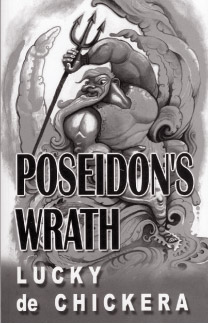 It is a story of a fisherman's family. For two or three days at a
time the father was away from his family out at sea with his fishing
nets. His wife helped supplement the family income by providing cook
food to nearby tourist hotels. It is a story of a fisherman's family. For two or three days at a
time the father was away from his family out at sea with his fishing
nets. His wife helped supplement the family income by providing cook
food to nearby tourist hotels.
Her son, helped her carry this food at dawn" each day, to the hotels
before he left for school. Being late for school was a problem he was
compelled to face. However, being a good student, the school excused his
late coming due to unavoidable circumstances Devika, his younger sister
was also attending school, and was the apple of her father's eyes.
When the story begins, Christmas in Hikkaduwa and Southern coastal
towns had been celebrated in grand style. Father had returned to the sea
for the next catch. Lal, his mother and sister Devika had their simple
night meal of bread and onion curry at the kitchen table on a very dark
foreboding night...unaware of what was awaiting them the following day.
When Devika next opened her eyes she found herself in a hospital
ward. Nurses in white caps and uniforms were walking about. To quote:
'Where was she and where was her mother? She recalled last moments when
both of them were standing together at the entance of a bookshop in the
town of Galle.
They had left their home town, Narigama"and had comet o buy books for
the new school term in the New Year. Voices had begun screaming " The
sea is coming ,the sea is coming!' She had tuned only to face a tall
wall of blue- green water frothing and coming down on them.' Unquote.
'Nurse why am I here and where is my mother?' she cried sobbing. 'You
were injured by the Tsunami and lost your memory. We have brought you to
the hospital. But now it appears your memory is returning.'
'Yes, my name is Devika my brother is Lal, my father is out at sea.
But my mother was with me in Galle town. Nurse please tell me, where is
my mother?'
It is from here that the story takes a twist from a natural disaster
to a ruthless kidnapping of an innocent victim who has lost her family.
Devika is drugged with sedatives and abducted from the hospital
premises by a woman pretending to be an attendant but in reality working
for an internationals syndicate who kidnaps girls from hospital sor
phanagesa nd homesf or the disabled to be sold for prostitution and drug
trafficking abroad.
Even when disaster stnrck in the forrr of giant wave from the ocean
the kidnapper continued her ruthless work for the thriving sex and drug
tade. For the sake of money helplessc hildrenw ereb ound,g aggeda nds
mugglede veno ut of hospitalsa ndh anded over to kidnappers.
As the story continues this disregard for the helpless victims of the
Tsuami is firther displayed by a display of sky rockets and fireworks
going offin all directions on New Years' Eve, just five days after the
national disaster.
Whenthe DIG and his assistantpolicemenmt anagedto savet he kidnappedc
hildren from the boatthat was aboutto take them to anew, unknown
destination, one girl turned to the rescue team and said with a
frightened look:
'I am Devika' Althougb Devika had lost her family she was happy to be
re-united with her surviving brother, Lal...
Book launch
"Apannaka Jathakaya - Uthum Thunuruvana Ape Ekama Pihitai"
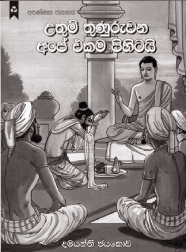 Damayanthi Jayakody's Buddhist book "Apannaka Jathakaya - Uthum
Thunuruvana Ape Ekama Pihitai" will be launched at Dayawansa Jayakody
Bookshop, Ven. S. Mahinda Mawatha, Colombo 10 on December 21. Damayanthi Jayakody's Buddhist book "Apannaka Jathakaya - Uthum
Thunuruvana Ape Ekama Pihitai" will be launched at Dayawansa Jayakody
Bookshop, Ven. S. Mahinda Mawatha, Colombo 10 on December 21.
Damayanthi Jayakody is the author of "Ape Budu Hamuduruvo", "The
Jewel of the Universe", "Deviyo Ehi Vediyaha", "Budu Dahamai Maha
Muhudai Kelanithissa Rajjuruvoi", "Ape Jathika Kodiye Sinna Nadaya", and
"Nalakaraya."
"Apannaka Jathakaya - Uthum Thunuruvana Ape Ekama Pihitai" is a
Dayawansa Jayakody publication. |

